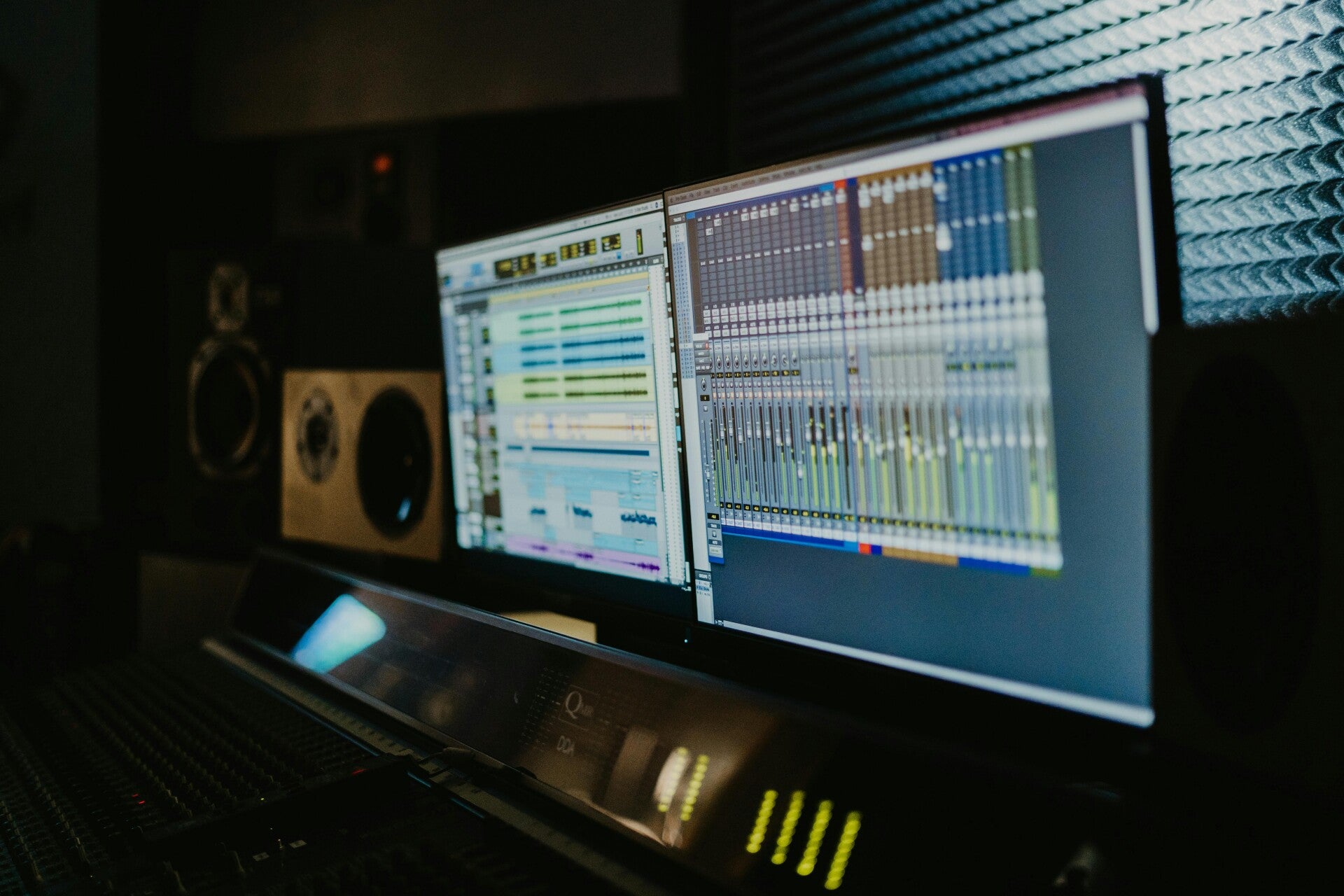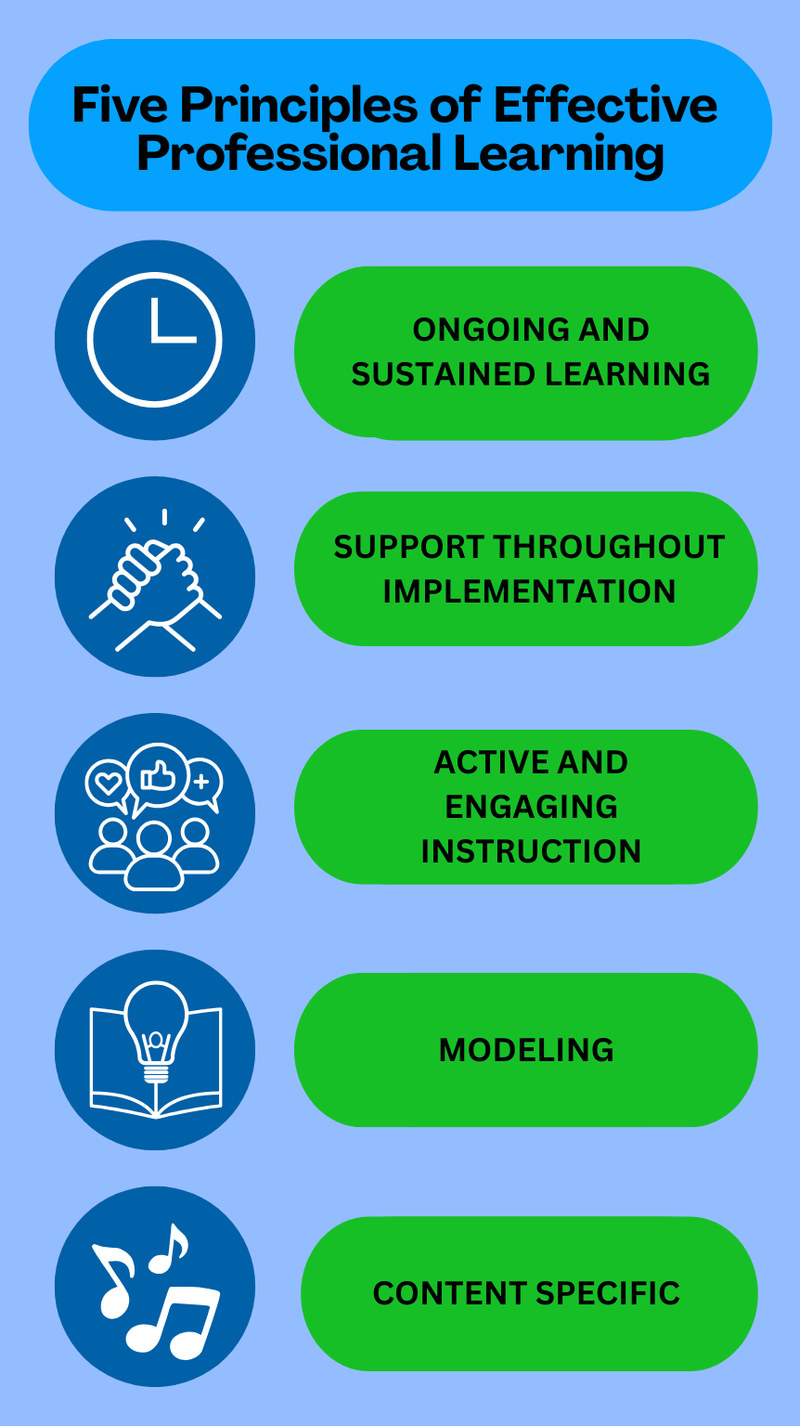Planning the Alternative PL Assignment
July 6, 2025


Presented by Mr. Joseph Fisher
The professional learning for the Rose Tree Media School District music teachers is designed to teach faculty how to create engaging media that aligns with the UbD curriculum (revised 2024). To achieve effective learning, a three-year plan will be developed, supported by the faculty and administration, and modeled by a veteran teacher who has designed similar resources for their students. Teachers will be encouraged to meet the needs of their classroom, but will also be given freedom to create the resources they believe necessary to support their learners. Centered on music education, this initiative is the first of its kind in our district and will pave the way for future professional learning experiences.
Mapping the Professional Learning
To sketch an outline of the professional learning experience that follows the five principles of effective PD, I began by completing Gagne's Nine Events of Instruction (Athuraliya, 2024). The steps in this map outline how I will present the concept to my colleagues following the Call to Action made to the RTMSD Professional Development Council:
Gain attention: I will present to my colleagues using an example of elementary students playing the recorder before and after I taught with my created video
Inform learner of objectives: I will share the BHAG and present milestone objectives for teachers to hit along a timeline
Stimulate recall of prior learning: Sharing stories from lesson planning during COVID-19
Present stimulus material: Share a behind-the-scenes look of the videos I have constructed through screen capture videos of Final Cut Pro and Motion. Explain in detail and share tips to complete a test video.
Provide learner guidance: Give feedback and tweak my instruction based on the speed of the learning process
Elicit performance: Teachers will create videos for their own students based on the current repertoire and curriculum
Provide feedback: Teachers share videos in a shared district music ePortfolio, as the instructor, I will provide timely feedback to the creator
Assess performance: Self-assessment, student trials, and sharing in our professional learning community
Enhance retention and transfer: Provide goals for teachers to build and improve their libraries past one year’s time; consider improving video quality through new technology and improving music repertoire based on student results
The professional learning will align with Gulamhussein's (2013) Five Principles of Effective Professional Learning.
- Ongoing and Sustained Learning: The RTMSD music faculty will engage in a year-long training schedule to gain skills that will be utilized and implemented into the curriculum over three years.
- Support Throughout Implementation: The lead instructor will facilitate training in person and through the Schoology LMS. Video tutorials, discussion boards, a dedicated webpage, and outside resources will be used to support the practice for the duration of the three-year period.
- Active and Engaging Instruction: Teachers will observe examples of media as well as student performances paired with the video resources. During the roll-out period, teachers will be encouraged to ask questions and request examples of student engagement.
- Modeling: The lead instructor will model the media creation using screen recordings and live demonstrations. The library of media will begin with the lead instructor's pre-made resources as exemplars.
- Content Specific: Music education is at the core of this professional learning, and teachers will be building a library of resources that fit into the K-12 curriculum.

Instructional Design
Overarching Course Goal
The music faculty will be empowered to enhance the student learning experience by creating and building a library of engaging, student-centered instructional media that focuses on music literacy and performance skills, enabling every learner to read and play music at their own pace.
| Learning Goals | Learning Activities | Assessment Activities |
|---|---|---|
| Foundational Knowledge: Understanding of evaluating music literacy and performance skills. | ✅ Borrowing and crafting applicable rubrics for grade levels ✅ Assessing students and sharing collected data with the professional learning community | ✅ Self-assessing using completed rubrics and notes from other teachers. |
| Application: Apply knowledge to create instructional media and teach students. | ✅ Use programs such as MuseScore, Soundslice, Logic Pro, Pixelmator Pro, Canva, Motion, and Final Cut Pro to create media for students to learn from and use for practice ✅ Gain mastery of tools from these applications under the tutelage of the instructor ✅ Build a library that aligns with the RTMSD UbD curriculum | ✅ Video submission of student performance, along with the created media |
| Integration: Connect the library of online lessons with classroom pedagogy. | ✅ Design lesson plans that incorporate the created media ✅ Assign advanced media to students achieving higher in music ✅ Share planning strategies with the professional learning community ✅ Track video performance to assess effectiveness ✅ Cross-evaluation of group members’ assessments | ✅ Record students performing before viewing the media and after practicing and performing with the created media |
| Human Dimension: Recognize and fulfill their role as facilitators of personalized learning. | ✅ Participate in the PA Music Educators community and share findings at district conferences ✅ Consistently check for student understanding before and after using digital media to perform | ✅ Review the results of the student survey on the changes in the learning experience |
| Caring: Develop a commitment to differentiated music learning that can include all students. | ✅ Create a department mission statement that includes a commitment to equity and inclusion - share with the RTMSD Equity team ✅ Share examples of success and failure from the classroom on a LMS discussion board | ✅ Quarterly self-evaluations of differentiation |
| Learning How to Learn: Build capacity for ongoing professional growth. | ✅ Develop shortcuts with the tech that allow for a faster workflow ✅ Propose a session to the PA Music Educators State Conference where we share our work as a department | ✅ ePortfolios built into a district music website featuring the video lesson library of all teachers |
Collaboration
Beginning with in-person instruction, discussion will begin as teachers have a chance to discuss the call to action, learning process, and the technology required to create resources. Teachers will have an opportunity to work in their subgroups as well as the larger professional learning community. Establishing the roles of teachers as co-learners will be vital to building a culture of collaboration. After the in-person sessions, teachers will continue to collaborate from their home buildings through the learning management system.
Using the provided discussion in Schoology, educators will share ideas and give feedback to their colleagues. This will be assigned and required for each module as the course progresses. In the first year, teachers will have a block of prep time devoted to sharing in the discussion every two weeks. In subsequent years of the process, educators will utilize this discussion board to ask questions and build their skills, while the created media content will be shared on the dedicated website for all to access.
Audience
The K-12 Music Faculty is comprised of subgroups that serve distinct student populations. As a part of the larger PLC, they will work and create together as they accomplish goals that serve the interests of the group.
Elementary General
All K-5 students take music, and this group of four educators will work together to create resources that can be used for the first six instructional levels in our district.
Instrumental Band and Strings
4th through 12th grade students can select an instrument and participate in lessons that morph into a class (band or orchestra) in secondary education. Resources can serve the elementary fundamentals through the literature that students will perform in secondary.
Secondary Choral
Building on the elementarhy general music program, students who select choir in middle school or high school can benefit from the continued use of media resources. The focus can be on exercises in solfege or literature that students will perform.
Secondary General
Students have the option to choose electives in 6th through 12th grades. The use of created media resources that align with the elementary program will provide appropriate learning experiences.
Schedule
Developed along with the district's calendar, the schedule will fit into the professional development plans, utilizing time available during the scheduled inservice days as well as teacher prep.
The proposal for Composing the Learning Experience will cover eight modules in the first year of professional learning. Although the majority of instruction will take place in the first year, the PL schedule indicates that there will be six additional modules over the two subsequent years. To ensure that learning is significant and ongoing, teachers will continue to build the library of media and train any potential new hires to participate in the learning (Gulamhussein, 2013).
The modules will be completed through a blended model with most of the instruction delivered asynchronously. Discussions will serve as checkpoints and establish connections from one module to the next. In-person learning will take place on district inservice days, with the option of additional flex workshops held at a school or through a web conference to provide support.
Leading the instruction
LEAD INSTRUCTOR
Joseph Fisher will design the Schoology LMS and lead the in-person sections of the course. Relying on the experience and resources gained through higher education, workshops, and other digital learning certificates, he will develop comprehensive modules, facilitate discussions, and answer questions throughout the learning experience.
INSTRUCTIONAL COACHES
The three district coaches will be available to assist with software management and technology troubleshooting. All non-music technology questions may be answered by this team.
DISTRICT MUSIC COORDINATOR
This music educator will ensure that created media resources align with the district's goals and UbD curriculum. Teachers will refer to this individual when they have questions pertaining to the music literature and scaffolding the content from Kindergarten through 12th grade.
Applications
Click on the logo to learn about the required software to create effective media resources
In addition to the required applications, the main resources required for this course are
- Dedicated prep time, flex time, and inservice training time for teachers to engage in professional learning
- District computer (Mac) that is equipped with the storage space necessary for larger video files.
- A dedicated website that all members of the music faculty can access to post and share their created media.
References
Athuraliya, A. (2024, December 25). Top 7 instructional Design models to create Effective Learning Material. Creately Blog. https://creately.com/blog/diagrams/instructional-design-models-process/
Canadian Education Association. (2015). Innovation that sticks: A case study of district-wide change. https://www.edcan.ca/wp-content/uploads/cea_ocsb_innovation_report.pdf
Gulamhussein, A. (2013). Teaching the Teachers: Effective Professional Development in an Era of High Stakes Accountability. Center for Public Education.
Harapnuik. D. (2020). Why I don’t use checklists, progress bars & other activity monitors. https://www.harapnuik.org/?p=8314
Standards for Professional Learning: Quick Reference Guide. (2019). Retrieved from https://learningforward.org/wp-content/uploads/2019/09/standards-reference-guide.pdf
TNTP. (2015). The mirage: Confronting the hard truth about our quest for teacher development. http://tntp.org/publications/view/evaluation-and-development/the-mirage-confronting-the-truth-about-our-quest-for-teacher-development
Wei, R. C., Darling-Hammond, L., Andree, A., Richardson, N., & Orphanos, S. (2009). Professional Learning in the Learning Profession: A Status Report on Teacher Development in the U.S. and Abroad. Technical Report. National Staff Development Council. Retrieved from https://learningforward.org/report/status-professional-learning-2/phase-professional-learning-learning-profession/









